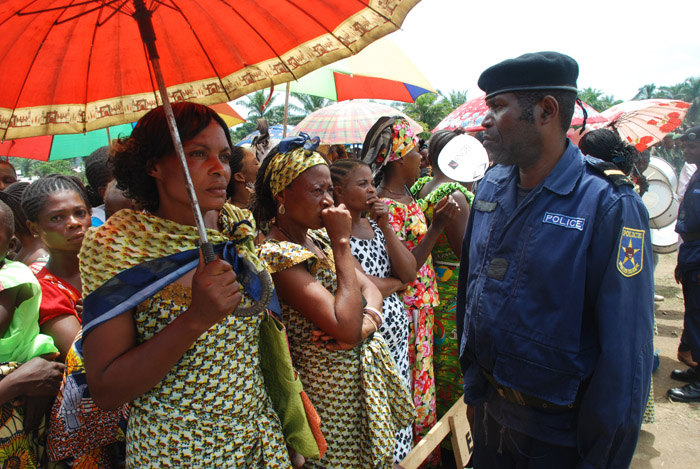
Nowhere are the detrimental effects of Congo’s conflict minerals trade – the presence of multiple armed groups vying for power at the expense of civilians, the widespread use of rape to exert power and control local communities, the stark contrast between natural wealth alongside a deeply impoverished society – more prevalent than in the area of Walikale.
Walikale is a territory and a town in North Kivu province accessible via a 45-minute flight from Goma. But despite the relatively short distance from one of eastern Congo’s largest cities, Walikale feels like it exists in its own world. “People in Walikale think that this is the whole world, they never even get to Goma to find out other ideas,” said a local government official. The area’s connections to the wider region primarily exist to support its minerals business. So it’s not a huge surprise to hear from those working in the natural resources industry in Walikale that they are unfamiliar with the end uses of the mineral ores – and just how valuable the region’s riches are to today’s technology-saturated world.
After meeting with miners, local administrators, army commanders, migrant workers, recently integrated former militia fighters, rebel leaders, small business owners, and civil society members, a few key issues surfaced. This isn’t meant to be a comprehensive list of recommendations, but rather a reflection on the strongest takeaways and what could encourage more local-level buy-in for efforts to trace, audit, and certify the minerals trade:
— High-level international engagement is needed to pressure Joseph Kabila to deliver on what his ban was meant to do: Fully demilitarizing mining sites; cracking down on mining mafia groups, particularly foreign and local armed groups (FDLR and Mai-Mai) and Congolese army officers involved in mining business; securing mining areas/sites so legitimate businesses can operate; pursuing mining contracts with the goal of increasing community benefit.
— A regional meeting attended by all key stakeholders (from high-level officials to representatives of local mining cooperatives and civil society groups) should be called to enable an open exchange of ideas and clarifications of positions. Currently, misinformation and misperceptions are further inflaming an already tense situation.
— The U.S. embassy should be doing public outreach in communities reliant on the minerals trade to educate on what the U.S. legislation will and won’t do. Working with the U.N.-supported Radio Okapi, local radio stations, civil society groups, and community/opinion leaders to circulate translated copies of the conflict minerals provision would be a good place to start. Through this outreach, U.S. officials can also begin to debunk conspiracies that are undercutting people’s understanding of the goodwill that motivated U.S. action on the conflict minerals issue – namely, the widely-held belief that bankrupt U.S., Canadian, and Australian mining companies are paying off human rights groups to lobby to cut off the trade from Congo.
— A perceived lack of follow-through is also undercutting the U.S. image in eastern Congo. For instance, a few people who have read the provision on conflict minerals expressed frustration that the U.S. had committed to producing maps of conflict mining areas in the east to help identify conflict-free mines for the mining business to proceed, but the maps have yet to be delivered to areas like Walikale. Failing to follow through on such commitments fuels the belief among local communities that the U.S. legislation was meant to cut off the Congo minerals market.
— Flying over the dense jungle territory of Walikale, one gets the sense of the vastness of the area just two trading centers are slated to cover. While the North Kivu mining department head in Goma Emmanuel Ndimubanzi estimates that 15 trading centers are needed for adequate coverage of the entire province, it is unclear who will pay for even the three more centers that Walikale alone still needs.
— Asked the simple question, ‘what does this community need most?’ the answer was almost invariable: Roads. The isolation of a place like Walikale fuels the lack of education, the dependency on the mineral trade, and the challenge of finding viable alternative livelihoods. The lack of a connection to the wider region also leaves communities prone to attacks by armed groups and facilitates military control of mines and indiscipline. Without alternative models of what they should be able to expect from their leaders and security services, community members become resigned to the status quo.
For a more global assessment of what needs to be done to implement an effective certification process for Congo’s minerals, check out the new Enough policy paper and activist brief published last week: Certification: The Path to Conflict-Free Minerals for Congo. Authors Sasha Lezhnev and David Sullivan describe lessons learned from past efforts to address social, economic, and environmental injustices in international trade, and lay out recommendations for streamlining efforts in Africa’s Great Lakes region.
Photo: Wives of Congolese soldiers line up in Walikale town for a military parade. (Enough/Laura Heaton)

